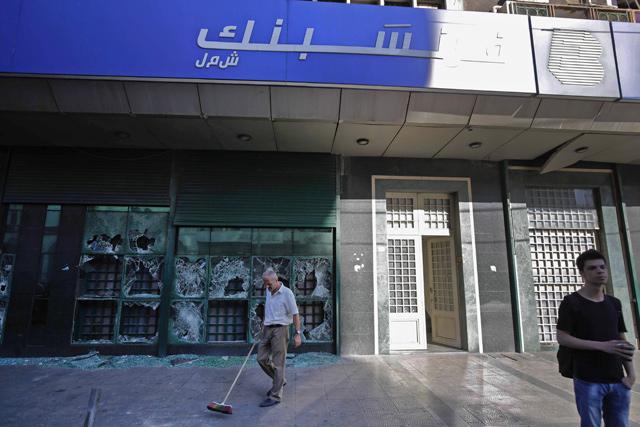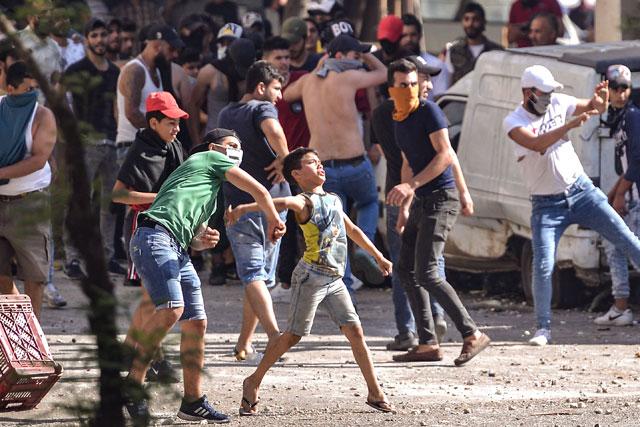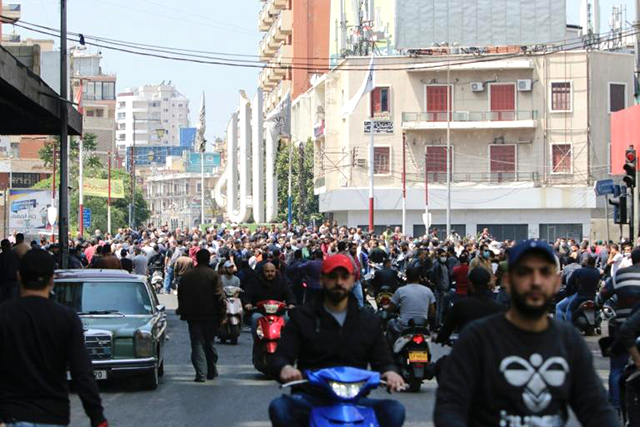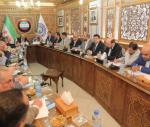You are here
Fresh Lebanon protests over spiralling economic crisis
By AFP - Jun 13,2020 - Last updated at Jun 13,2020

A man sweeps glass off the ground along a street outside the local branch of a Lebanese bank after it was vandalised by protesters earlier, in Al Nour Square in Lebanon's northern port city of Tripoli, on Friday (AFP photo)
BEIRUT — Dozens of demonstrators angered by a deepening economic crisis rallied for a third consecutive day on Saturday after a night of violent riots sparked condemnation from the political elite.
Rallying against the surging cost of living and the government's apparent impotence in the face of the worst economic turmoil since the 1975-1990 civil war, protesters gathered in central Beirut, brandishing flags and chanting slogans.
In the northern city of Tripoli, young men scuffled with security forces who fired rubber bullets to disperse crowds.
The stand-off began after young men blocked a highway to prevent a number of trucks carrying produce destined for Syria from passing through, according to the official National News Agency.
The Lebanese Red Cross said it treated nine people wounded in Tripoli.
The rallies came ahead of a speech by Prime Minister Hassan Diab at 15:00 GMT.
"We are here to demand the formation of a new transitional government" and early parliamentary elections, Nehmat Badreddine, an activist and demonstrator told AFP in central Beirut.
Lebanon is caught in a spiralling economic crisis, including a rapid devaluation of the Lebanese pound, which has triggered a fresh wave of demonstrations since Thursday.
Lebanese media reported that the exchange rate had tumbled to 6,000 per dollar on the black market early on Friday, compared to the official peg of 1,507 in place since 1997.
After a crisis meeting on Friday, President Michel Aoun announced that the central bank would implement measures from Monday including "feeding dollars into the market", in a bid to support the Lebanese pound.
Despite the government's pledges, roughly 200 young men gathered on mopeds in central Beirut on Friday night. Some of them defaced shop fronts and set fire to stores, causing serious damage.
Security forces fired tear gas to disperse them and some of the young men threw stones and fire crackers back. Tension petered out after midnight.
In Tripoli, demonstrators threw stones and Molotov cocktails towards soldiers late on Friday and damaged the facades of several banks and shops. Soldiers responded with tear gas.
The next day, Diab called on officials to assess damage in central Beirut.
Former premier Saad Hariri toured the area, condemning vandalism and riots.
Interior minister Mohammed Fahmi said security forces would find those responsible for damaging property in the capital.
Lebanon — one of the most indebted countries in the world with a sovereign debt of more than 170 per cent of gross domestic product — went into default in March.
It started talks with the International Monetary Fund last month in a bid to unlock billions of dollars in financial aid. Dialogue is ongoing.
Unemployment has soared to 35 per cent nationwide.
The country enforced a lockdown in mid-March to stem the spread of the novel coronavirus, dealing a further blow to businesses.
Related Articles
BEIRUT — Lebanese authorities toughened their tone on protests Monday, promising arrests for "vandalism" after several days of angry demonst
TRIPOLI, Lebanon — A 26-year-old protester died on Tuesday from a bullet wound he sustained during overnight clashes between hundreds of ant
BEIRUT — Lebanese demonstrators have taken to the streets to demand an end to a months-long political vacuum, with police firing tear gas at

















